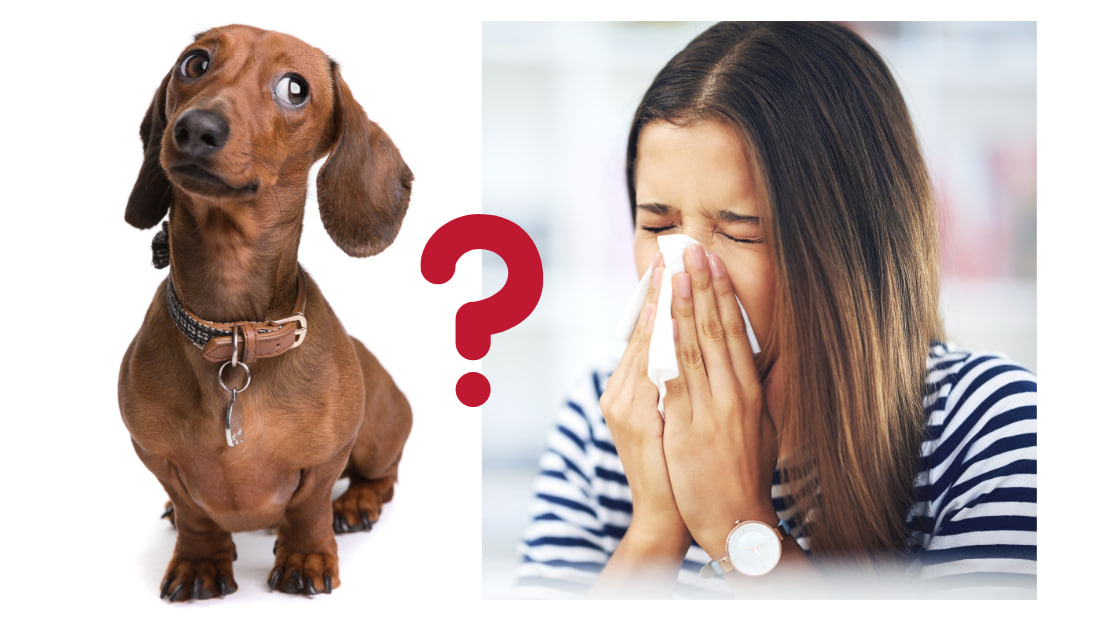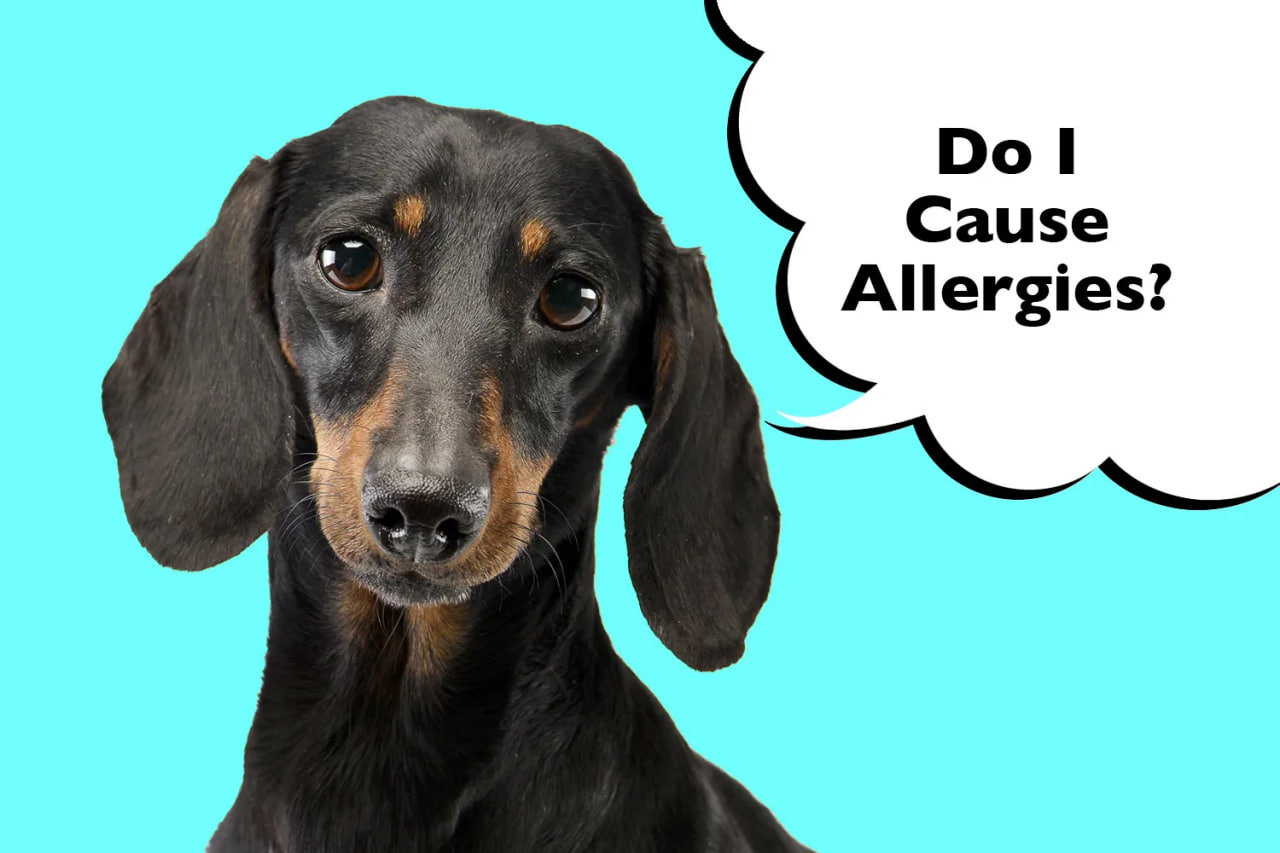Dachshunds, beloved for their distinctive long bodies and playful personalities, are not considered hypoallergenic dogs. This article explores the relationship between Dachshunds and allergies, providing crucial information for potential owners wondering, ‘Are dachshunds hypoallergenic?’
In the following sections, we’ll delve into the specifics of Dachshund allergens, compare them to hypoallergenic breeds, and offer practical tips for managing allergies. Whether you’re a current Dachshund owner or considering bringing one into your home, this guide will help you navigate the challenges of pet allergies

Are Dachshunds Hypoallergenic?
A frequent question among potential dog owners is ‘Are sausage dogs hypoallergenic?‘ To answer this, we need to understand what hypoallergenic means in the context of dogs, particularly for Dachshunds, also known as sausage dogs.
Dachshunds are not hypoallergenic dogs. While the term “hypoallergenic” suggests a dog that doesn’t trigger allergies, it’s important to understand that all dogs produce allergens to some degree.

Main Sources of Allergens in Dachshunds
Dachshunds, like all dogs, produce allergens primarily through their dander (dead skin cells), saliva, and urine. These allergens can cause reactions in sensitive individuals, ranging from mild irritation to severe respiratory issues.
How These Allergens Affect Individuals with Allergies
When exposed to dog allergies, susceptible individuals may experience symptoms such as sneezing, runny nose, itchy eyes, and in severe cases, asthma attacks. The severity of reactions can vary depending on the person’s sensitivity and the amount of allergen exposure.

Difference Between Shedding and Allergen Production
While shedding and allergen production are related, they are distinct processes. Shedding refers to the natural loss of hair, while allergen production involves the release of proteins found in a dog’s skin cells, saliva, and urine. These allergens are continuously produced and are not directly tied to the amount of visible hair a dog loses. This distinction is important to understand when addressing the question, “Are dachshunds hypoallergenic?“
Dachshunds come in three coat varieties, each with different shedding patterns that can affect allergy sufferers differently:
Smooth-coated
These Dachshunds shed moderately throughout the year. Despite the steady shedding, their shorter hair can often be less noticeable around the home. However, it’s important to note that even short hair carries allergens, which can trigger reactions in sensitive individuals.

Long-haired
According to the AKC breed standard, long-haired Dachshunds have sleek and often slightly wavy hair that hangs long around their ears, neck, chest, legs, and underside. This variety sheds moderately throughout the year, similar to the smooth-coated Dachshund. However, the long-haired Dachshund’s coat requires more maintenance. Frequent brushing is necessary to prevent mats and tangles, which increases contact with dander. For owners with allergies, the grooming process can trigger reactions, so wearing masks and gloves during grooming is recommended to minimize exposure.

Wire-haired
Wire-haired Dachshunds have a distinctive double coat, leading to heavy shedding during spring and fall. The dense undercoat can trap allergens, and when these dogs shed, the allergens are released into the environment. This seasonal shedding can exacerbate allergy symptoms, making it crucial for owners to stay vigilant about grooming and cleaning during these periods.
The impact of shedding on allergen spread can be significant, as loose hair can carry allergens throughout the home. Regular grooming and cleaning can help mitigate this, but it’s essential to recognize that even minimal shedding can contribute to allergen presence. For those wondering ‘are dachshunds hypoallergenic,’ understanding these shedding patterns is key to managing their living environment effectively and reducing allergy symptoms.”

Managing Allergies with Dachshunds
For those determined to share their lives with a Dachshund despite allergies, there are several strategies to minimize allergen exposure.
Grooming Practices
Regular grooming is essential in reducing dander and shedding. Aim to brush your Dachshund at least 2-3 times a week to remove loose hair and dander. Monthly baths using a gentle, dog-specific shampoo can also help keep dander levels low. Pay special attention to their coat type, as long-haired and wire-haired Dachshunds may require more frequent grooming to prevent mats and tangles, which can exacerbate allergen spread.

Cleaning Habits
Maintaining a clean home environment is crucial for managing allergies. Frequent vacuuming, especially with a HEPA filter vacuum, can effectively remove allergens from carpets, rugs, and furniture. Additionally, using air purifiers can help reduce airborne dander and other allergens. To further minimize exposure, consider keeping your Dachshund off furniture and using washable, hypoallergenic covers for areas where your dog frequently rests.
Home Environment
Creating an allergen-reduced living space is vital for allergy sufferers. Consider using hypoallergenic bedding for both you and your Dachshund, and designate certain areas of your home as dog-free zones to limit allergen spread. Regularly wash your dog’s bedding and toys, and ensure proper ventilation in your home to reduce the concentration of allergens. These steps can make a significant difference in managing allergies while enjoying the companionship of a Dachshund.
While managing allergies is crucial for living comfortably with a Dachshund, proper nutrition also plays a vital role in maintaining your pet’s overall health and potentially reducing allergen production. A well-balanced diet can contribute to a healthier coat and skin, which may help minimize dander. To learn more about providing the best nutrition for your Dachshund, check out our guide on the Best Dog Food for Dachshunds. Choosing the right food can not only support your Dachshund’s health but may also indirectly help in managing allergy symptoms.

Comparing Dachshunds with Hypoallergenic Breeds
When considering if Dachshunds are hypoallergenic, it’s essential to understand how they compare to breeds that are generally more suitable for allergy sufferers. While Dachshunds are beloved for their distinct appearance and lively personality, they are not considered hypoallergenic.
Low-Allergen Breeds
Some breeds, such as Poodles, Bichon Frises, and Portuguese Water Dogs, are often recommended for allergy sufferers due to their low-shedding coats and reduced dander production.
Dachshunds vs. Hypoallergenic Breeds
In contrast, Dachshunds tend to produce more allergens due to their shedding patterns and dander production. They have three coat varieties: smooth, long-haired, and wire-haired, each of which sheds differently but still releases dander into the home environment. This can make Dachshunds less suitable for individuals with severe allergies compared to hypoallergenic breeds. However, it’s important to note that individual reactions to allergens can vary. Some people with mild allergies might find that they can tolerate Dachshunds well with proper grooming and regular cleaning to minimize dander. Despite this, those with severe allergies may still experience discomfort.

Tips for Allergy Sufferers
If you’re an allergy sufferer considering a Dachshund, consider the following advice:
Consulting an Allergist
Before bringing a Dachshund into your home, consult with an allergist. They can provide personalized advice and may suggest treatments like immunotherapy to help manage your symptoms.
Lifestyle Adjustments
Implement strategies to reduce allergen exposure, such as using high-quality air filters, regularly cleaning your home, and creating dog-free zones in bedrooms.
Choosing the Right Pet
For those with severe allergies, it may be wise to consider more hypoallergenic breeds or even non-canine pets that are less likely to trigger allergic reactions. While allergies are an important consideration when choosing a Dachshund, it’s equally crucial to be aware of other health issues that may affect this breed. Understanding common diseases in Dachshunds can help you provide better care for your pet and potentially minimize factors that could exacerbate allergies. To learn more about the health challenges specific to Dachshunds and how to address them, we recommend reading our comprehensive guide on Common Diseases in Dachshunds. Being informed about these health issues will not only help you make a more educated decision about pet ownership but also ensure you’re prepared to provide the best possible care for your Dachshund, whether you have allergies or not

Conclusion
While the answer to “Are Dachshunds hypoallergenic?” Their delightful personalities and devoted nature make them a beloved choice for many dog enthusiasts. If you have allergies, living with a Dachshund is still feasible with appropriate management strategies and medical advice, even though they’re not hypoallergenic. It’s essential to evaluate your personal situation and consult with allergists and veterinarians before deciding to bring a Dachshund into your home, especially if you’re concerned about allergies. With careful planning and an understanding of how to manage a non-hypoallergenic breed like the Dachshund, the companionship of these lovable dogs can be a rewarding experience that may outweigh the challenges of managing allergies. We’d love to hear your thoughts and experiences on living with Dachshunds despite allergies-please share your comments below!

Cuddle Companions is your go-to resource for everything you need to keep your furry friends happy and healthy. We specialize in providing detailed and helpful information about the best foods, treats, and care practices for pets of all kinds. Whether you’re a seasoned pet owner or a new puppy parent, our team of experienced and passionate experts is dedicated to offering reliable advice and recommendations. At Cuddle Companions, we believe that a well-cared-for pet is a happy pet, and we’re here to help you every step of the way. Visit us at [bestdogfoodfordachshunds.net] for more information and resources.

